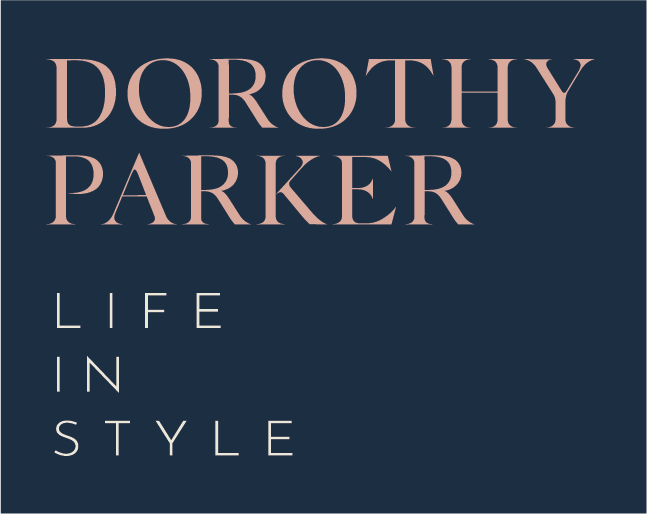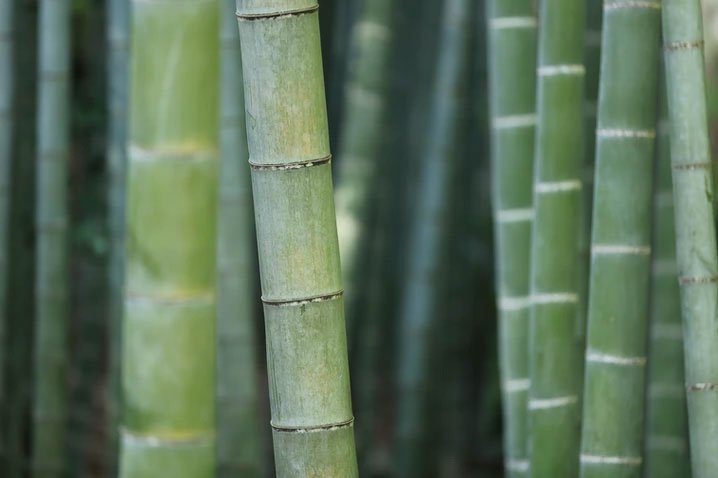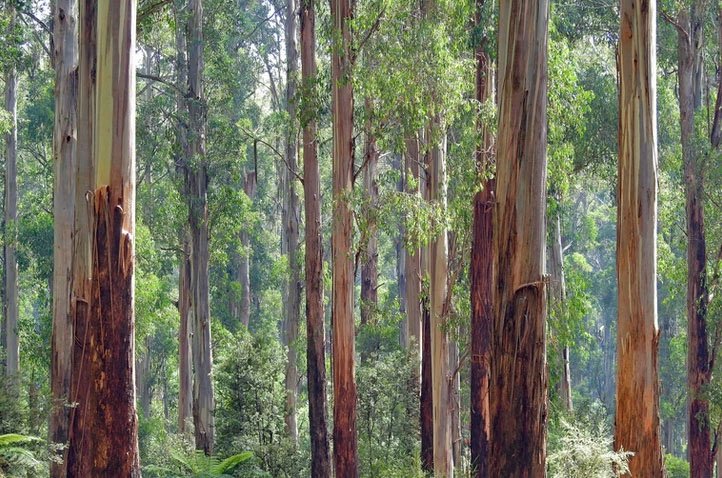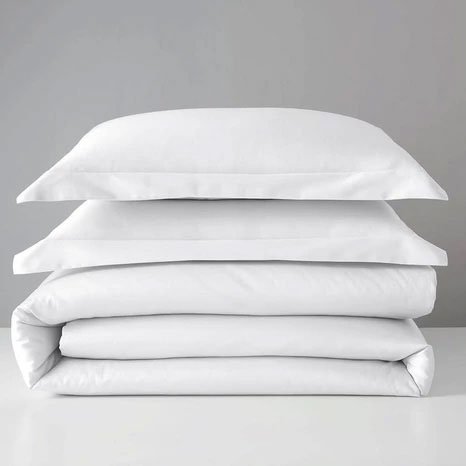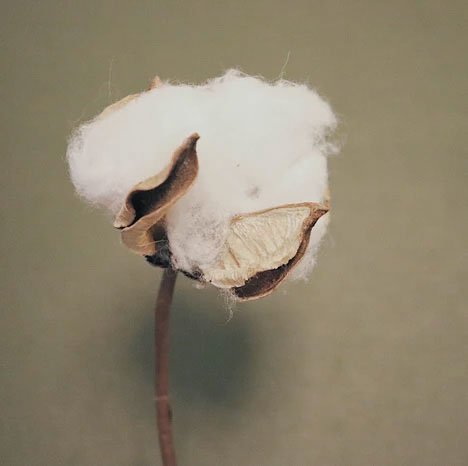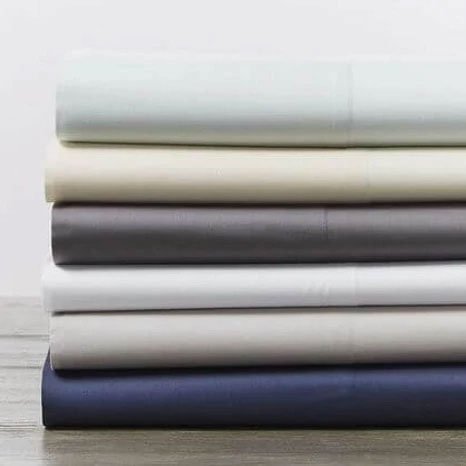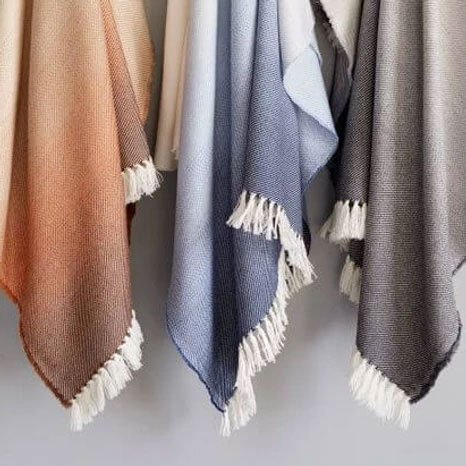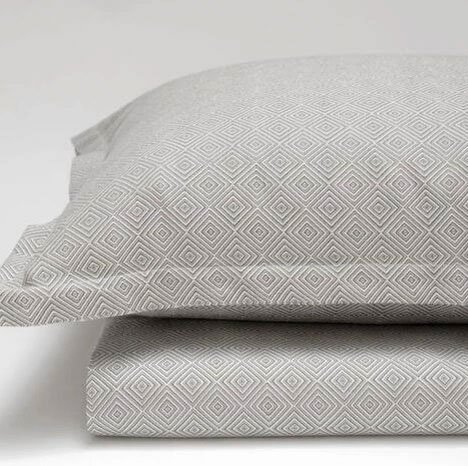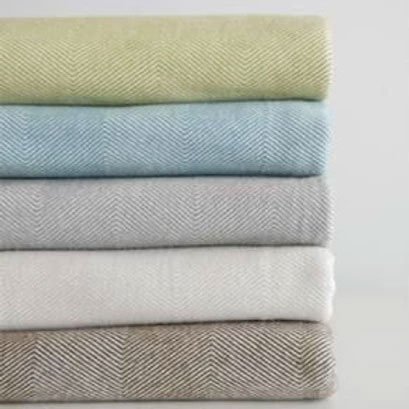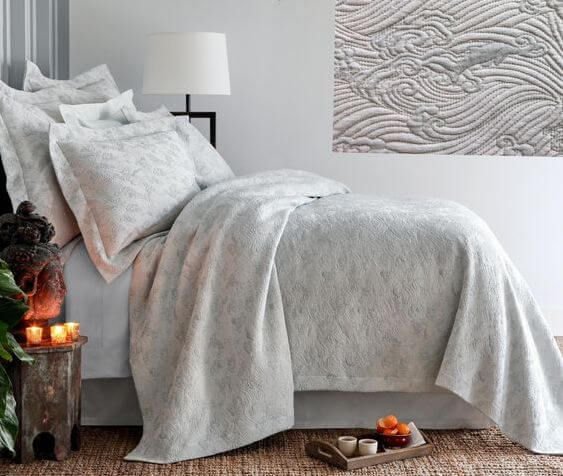Top 10 Organic Sheets & Bedding
Perfect for Fall: Green Bedding by Flax Linen
Welcome to our second Sustainable Design Series post.
If you are someone who values eco friendly products and tries to implement “green” goods into your home, it’s important not to overlook your bed, a place where you spend eight hours (give or take) a day (or ⅓ of your life!). Bedding is something everyone has but it doesn’t have to be utilitarian nor an overlooked detail. Bedding can be a wonderful boost to your bedroom and an instant makeover.
Maybe you’re someone who always buys organic food but haven't considered the impact of the materials grown to make natural fabrics and textiles. Or maybe you're looking to upgrade and refresh your bedding and make conscious buying decisions.
In either case purchasing organic bedding is not only good for your health, it’s good for the planet and for the folks who are farming and manufacturing any type of crop or product.
If you’re worried about breaking the bank, don’t be. Organic bedding can be a luxury item but, like many other organic and sustainable goods, the price continues to go down as demand grows. Whether you want top-of-the line bed linens or you are looking for bedding on a budget, I have done the research and found the most sustainable, organic sheets, duvets and blankets to make your bed a sleep haven.
Also, maybe you’re wondering what the deal with the certification labels like GOTS, OEKO-TEX and Fair Trade? I’ve got you covered with definitions of all three. I’ve also included a handy explanation between cotton and linen textiles and how they can be cultivated in a sustainable fashion. And if you’re curious about bamboo and eucalyptus, I have some info on those too.
The Scoop on Cotton and Linen and Sustainability
Cotton is possibly the most popular and profitable natural and renewable material on the global market today. If not grown caringly, this crop can damage the environment due to the substantial use of pesticides, abundant water requirements and soil taxation. Thankfully organic cotton is more popular than ever and that is driving demand to push cotton growers and manufacturers to be more eco friendly, sustainably produced and fairly traded.
Since cotton is such a big industry the price is generally lower than other natural fibers which continue to drive the demand for cotton products. If you’re looking for healthy bedding and home textiles on a tighter budget, cotton is going to be your best choice.
While cotton plants use a good amount of water to farm, the processing of cotton generally does not require harmful chemicals to make it into a fiber that can be woven into a textile. This puts it ahead of newer textile types such as Bamboo or Eucalyptus which both are heavily processed, in some cases, with toxic chemicals.
Fibers Under the Microscope
Linen is a more sustainable choice when compared to cotton. Linen is derived from the flax plant and since it uses less water and space you will get more yield from this crop. Additionally, flax is less prone to pests which make it easier to grow organically. Lastly, flax crops leave behind minimal wastage because of its biodegradability.
Linen is naturally stronger than cotton due to the natural fiber makeup: when you look at the two under a microscope you see cotton is a spiral fiber that reminds me of Gemelli pasta while linen is quite straight and thicker than the cotton fiber. This difference makes linen about 30% stronger than cotton. Rumor has it that the Queen of England is partial to linen sheets at the castle.
Fun Fact: Flax blooms once a year for only a few hours!
Last note on farming flax for linen textiles, while flax is a great crop that is easier to grow it can only be planted every seven years. In other words, you plant a flax crop, harvest it and then will need to plant something else as the soil won’t produce flax for another 5-7 years. It’s unclear why this is the case since as a crop flax isn’t a soil taxing crop.
Because of the lack of production one drawback of linen is that it is often more of an investment as cotton is a more available crop. I personally think the price of linen will continue to drop as demand rises and more farmers cultivate this crop in-between growing other food crops.
What About Bamboo & Eucalyptus Bedding?
There are a few companies out there who specialize in making bedding with Bamboo and Eucalyptus. There are some pros to both: they are fast growing and require low water, plus Bamboo is naturally pest and disease free. Bamboo also improves soil quality and stores more CO2 than trees due to its density.
Being that both bamboo and eucalyptus are so sustainable it would seem natural that they would make good options for bedding, right? Well the answer to that is yes and no. The textiles created are super soft but there are cons when it comes to the processing methods.
While growing these crops is water sustaining, processing them is not. It takes a lot of water and other chemicals to break down the plants cellulose and convert them into yarn. Additionally there are reports that much of the eucalyptus trees come from areas that have clear cut forests to produce this crop.
Because of the murkiness around these materials, I’m going to base my bedding recommendations on cotton and linen since there is more evidence-based research on the cultivation of them.
What does it mean to be certified by GOTS, OEKO-TEX and Fair Trade Certified?
When looking for organic textile products of any kind you will see a handful of labels communicating their certifications and values. As I wrote in my last post on Forest Steward Certified products, seeing these labels makes me wonder, what do they really mean?
The top three I saw for sustainable home textiles were GOTS, OEKO-TEX and Fair Trade Certified. Let’s break them down shall we?
GOTS stands for the Global Organic Textile Standard. Organic farming is important not only because of the eco friendly aspect but also because it has substantial social benefits for the farmers and producers. The vision of GOTS is that “organic textiles will become a significant part of everyday life, enhancing people’s lives and the environment”.
When you purchase products that are made with organic fabric they don’t go through the same certifications as organic food. This is where GOTS comes into the picture.
To be certified by GOTS each stage and process of growing and producing the textile will be scrutinized for not only chemicals used to grow the crop but also how the fabric is finished. For example to be GOTS certified a textile can’t be bleach treated or dyed with toxic colorants.
This also includes that the chemicals commonly used on textiles such as flame retardants, heavy metals and formaldehyde (a known cancer cause), among others can’t be used at any time during the process of making the fabric.
This handy video is a great breakdown of the four criterias that must be met to be GOTS certified.
OEKO-TEX labeled items ensure the absence of harmful chemicals. A Swiss organization founded in 1992 with a Mission to “create trust in textiles and leather in their production: through increased product safety, improving sustainable production and a sustainable, transparent value-creation chain”.
Similar to GOTS, articles labeled with OEKO-TEX (or other OEKO certifications) means that every component of the article (fabric, thread, buttons, etc.) has been tested for harmful substances. These harmful substances include chemicals such as azo dyes, formaldehyde, nickel and other chemicals known to be harmful to not only humans but the environment as well. There are four classes of certification broken down as follows:
Articles for babies & toddlers
Articles with direct contact to the skin
Articles without direct contact to the skin
Home textiles
They also have the Leather Standard by OEKO-TEX which was founded in 2016 and applies to leather or fur products.
GOTS vs. OEKO-TEX - So what’s the difference?
GOTS items must be organic, free of harmful chemicals, consciously produced and manufactured without discriminationatory practices. When an article is certified OEKO-TEX, it must meet their guidelines to be free of harmful chemicals but does not have to be organic nor does it have to incorporate equity in manufacturing and distribution.
The Fair Trade label is an all compasing certification that includes food (chocolate!), beverages (coffee!), clothing, furniture, flowers and many other consumer products.
The Fair Trade movement is made up of a diverse network of companies, organizations and consumers that “put people and the planet first”. To be Fair Trade Certified the product had to be verified that it was created under rigorous social, environmental and economic Fair Trade standards which include paying a fair wage to the workers.
I love the FTC’s mission statement, it clearly communicates their goals to create a model of responsible business and conscious consumerism to help eliminate poverty and enable sustainable development around the world.
Fair Trade follows six of the seventeen United Nations’ Sustainable Design Goals (UN SD) including:
No Poverty - UN SD Goal #1: to end poverty in all its forms everywhere
Gender Equality - UN SD Goal #5: Achieve gender equality and empower all women and girls.
Clean Water & Sanitation - UN SD Goal #6: Ensure availability and sustainable management of water and sanitation for all.
Decent Work and Economic Growth - UN SD Goal #8: Promote sustained, inclusive and sustainable economic growth, full and productive employment and decent work for all.
Responsible Consumption & Production - UN SD Goal #12: Ensure sustainable consumption and production patterns.
Life Below Water: UN SD Goal #14 - Conserve and sustainably use the oceans, seas and marine resources for sustainable development.
Fair Trade Certified has loads of information on their website including resources featuring articles and videos and literature pertaining to their movement.
While Fair Trade Certified doesn’t mean that they are organic, almost half of the products certified are certified organic as well.
Onto Bedding: The Difference Between Sateen & Percale
With cotton bedding there are two main styles: Sateen and Percale. What’s the difference?
The distinction between the two is that Sateen bedding has a silky hand and is soft to the touch. Sateen is also slightly heavier than Percale making a slightly warmer option.
In contrast, Percale is a crisp, soft fabric with a matte finish. Being lighter and cooler to the touch than Sateen, it’s great for warmer weather.
Without Further Ado, Here is My List of the Top 10 Organic Bedding Sources:
1. Coyuchi
Coyuchi is the gold standard when it comes to eco friendly and fair trade textiles. For as long as I can remember, I have loved all things Coyuchi. One reason I love them is they have extensive experience in the business of bedding that demonstrates their sustainable values. They have amazing bedding including patterned “coastal inspired” duvet covers and blankets in addition to your standard organic sheet sets. You can also look to them for comforters, bed pillows, towels, baby items and sleepwear among other high quality organic products.
Coyuchi was one of the first to bring organic cotton linens to the market over thirty years ago. I could go on and on about their values, design initiatives and certifications.
Coyuchi is devoted to making products that last a lifetime, in fact they have a Take Back program that will recycle or renew your old Coyuchi linens so they won’t end up in a landfill when you're ready for a new set.
Certifications: GOTS, Global Organic Latex Standard (GOLS) , and a Fibershed partnership which ensures sustainable farming practices for wool collection.
2. Sol Organics
Beautiful bedding that hits the mark when it comes to equity and luxury, Sol Organics has a handsome collection of bedding and towels.
They carry sheets and duvet covers both made of cotton and linen plus everything on their site is organic. And as a bonus you can try their bedding for 30 days risk free.
Sol Organic was created by two friends who had made it their mission to create ethical bedding that was not only organic but also treated workers with fairness.
Their certifications include: GOTS, OEKO-TEX, Fair Trade, and FLO.
3. Under The Canopy
A company that clearly values sustainability and achieves that sustainability through “purposeful design and high-quality materials that keep products looking food and lasting longer”. Under The Canopy specializes in bedding but also offer a plethora of home goods including mattresses, towels, and baby goods among a variety of sustainable home products.
The look of Under The Canopy gives a chic, clean, hotel feeling. Their hotel border sheet set might be the best getaway we can all expect for a while. And with their basic organic sheet set starting at $69 you can have organic luxury on a budget.
Certifications: GOTS, OEKO-TEX, Fair Trade, FSC, and WELTRAK
4. Holy Lamb Organics
With a mission to “to create beautiful, sustainable handcrafted products using all natural and organic materials for a healthy, eco-friendly life and home”, Holy Lamb is a wonderful eco friendly company.
Holy Lamb’s specialty is really comforters, deemed in the Oprah magazine as “wonderfully fluffy” when listed as one of their “favorite things”.
Their website and products remind me of a well designed and crafted Waldorf home store. They are not only all organic but many of their products are made in Oakville, Washington in a zero waste, plastic free workshop.
Their sheet sets are beautiful but one should note they are made by respected partner companies and not in their Washington workshop.
Certifications: GOTS, IOAS (International Organic Accreditation Services), Eco Wool, and FSC
5. Earthsake
Earthsake strives “to be the best resource for the finest quality bedding, bath and unique products for natural & healthy living”. They have three brick and mortar stores in Berkeley, New York and Austin, but their website is packed full of great eco friendly products including bedding, sheets, mattresses and bath linens.
Earthsake was founded in 1990 as a tribute to the twentieth anniversary of Earth Day and like Coyuchi was a forefront leader in the organic movement by creating sustainable and earth-friendly products.
Their products and practices carrying some eleven certifications. I’ll spare you the extensive list of but of course they include GOTS among them.
7. Plover
If the basic white hotel look isn’t your thing check out Plover. Their bright colors and patterns are created by Marisa & Sheila, sisters-in-law who wanted to create a safe and healthy environment for their budding families back in 2007.
Their playful prints and vibrant colors are achieved with dyes that are low-impact and fiber reactive making them highly colorfast. The great thing about these dyes is that they are all OEKO-TEX certified so you don’t have to worry about harmful chemicals and metals. Also, they reclaim all of the dye materials and do not release them into the river or sea like manny textile plants (how is that a thing?!).
Plover didn't just stop at bedding. They also carry curtains, table linens (including these super cute cocktail napkins) aprons and pillows. All of their textile products are GOTS certified and everything they sell is made by manufacturers that are audited by the BSCI, which provides ethical standards for the workers by improving social performance in global supply chains.
Given that many of their prints are botanically inspired, it makes sense that they now carry gardening materials including Dahlia tubers (which quickly sold out) and a carefully curated selection of garden tools and gear including some hand-forged pieces.
6. The Company Store
A long established business, The Company Store has been making bedding for over 100 years. They offer a good selection of organic bedding at a lower price than the some of the above mentioned companies. In addition to your basic sheets and duvet covers they also offer a variety of prints, comforters, towels and other bath linens, and pajamas (including matching family sets).
Looking for cute organic kids bedding? The Company Store carries some super fun patterns including hearts, stars, animals, dinosaurs and some sweet forest animals.
8. West Elm
I’ve talked a lot about West Elm’s sustainability goals and practices so it’s no surprise that they have a nice selection of organic bedding. They carry duvets, quilts and sheets in their simple modern style in Percale, flannel and textured cotton.
Their website makes it easy to sort through which items are organic (as not all of them are), Fair Trade, and Sustainable Sources by their symbols featured on each item.
9. Anna Sova
Sea Shepherd Matelasse Duvet Cover
Since the 1980’s the founder of Anna Sova has traveled the world in search for the highest quality, sustainable goods and the most ethical workshops. All of this research puts Anna Sova in the forefront of all things organic and sustainable including sheets and bedding, bath linens, kitchen towels, and what could be the most non-toxic paint on the market.
Anna Sova’s showroom is based in Dallas, TX and the bedding style reflects a more traditional, southern luxury that reminds me of my very stylish, southern grandmother. With Anna Sova’s bedding starting at $200 for a twin set, this bedding is for those who enjoy top tier luxury products.
10. Flax Linens
A Denver based company with a deep history of harvesting, weaving & trading flax linens since the early 1800’s. As I explained above, linen can be more of an investment but also durable fiber that is going to last. One thing I love about the company, Flax Linens, is that you can customize your own set. Aside from customization, they sell a carefully curated collection of duvet covers, sheet sets, singles and even a baby sleep sack.
Thank You ❤️
If you have made it to the bottom of this super long post, I so thank and appreciate you for it! It also shows that you are someone who values sustainability, eco-friendliness and the health of your home and the planet.
And a quick recap:
When buying textiles for your home, organic is best but GOTS is even better. After researching the differences between cotton, linen, bamboo & eucalyptus I feel better investing in either cotton or linen due to the questionable processing of bamboo & eucalyptus. And a friendly reminder that OEKO-TEX and Fair Trade certifications are great to carry but that doesn’t mean those products are organic.
While I listed my top ten sources, I realize there are plenty more brands and sources for organic bedding out there. Do you have one you like not on this list? Let me know below in the comments. And remember, if you enjoyed this post sharing is caring!
Are you interested in creating an organic, healthy home or room? Have questions about our sustainable/eco-friendly design services? Give us an email, we would love to chat more!
xoxo, Dorothy
